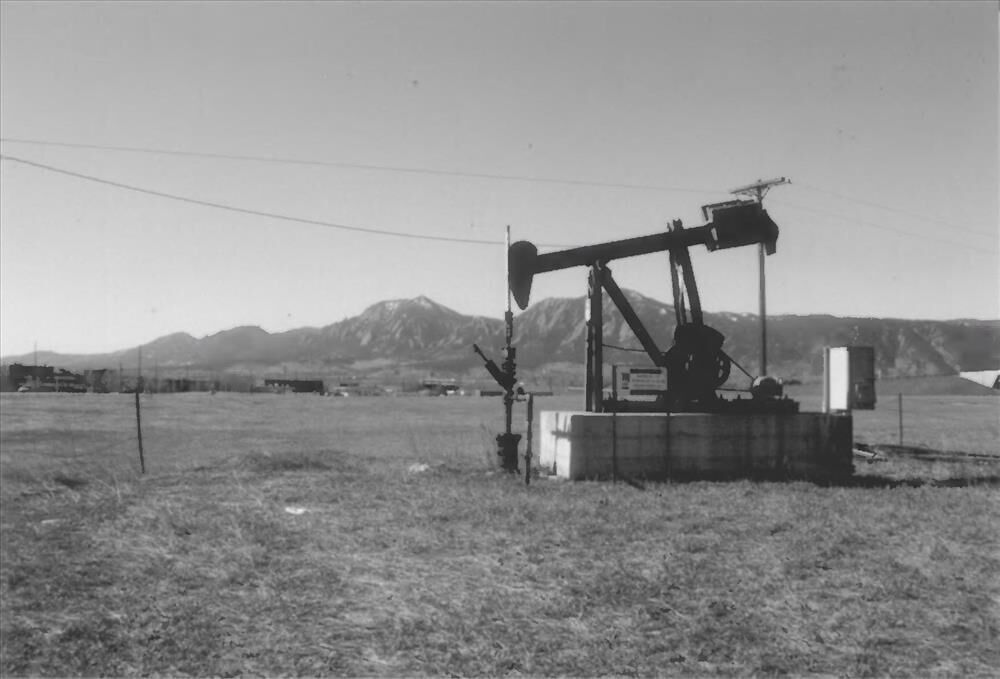Oil and gas leases throughout Colorado could be impacted by court ruling

A Colorado Supreme Court case could invalidate oil and gas leases statewide if the justices side with Boulder County in interpreting state property law, lawyers for a company seeking to drill wells in the county argued Tuesday.
At issue is the dispute between Crestone Peak Resources Operating LLC and Boulder County over the company’s application to drill up to 140 wells on 2,270 acres in the eastern part of the county under mineral leases it owns.
Specifically, the justices will decide whether pipeline maintenance that lasted for 122 days, shutting down production, means it actually “ceased” and, therefore, the oil and gas leases had been terminated.
“It’s important to recognize what Boulder is asking for here,” said Crestone’s attorney Fred Yarger in the hearing. “It’s asking for a broad statewide rule that will apply to every single oil and gas lease in the state of Colorado.”
The county’s policy, as described on its website, seeks to limit oil and gas activities within its borders It has maintained that its actions are meant to protect its properties and public health.
When the Colorado Oil and Gas Conservation Commission, which regulates oil and gas activities in the state, suspended the proceeding pending litigation in 2018, the county sued Crestone in Boulder District Court, asking the latter to rule that the leases had terminated.
When the district court issued a summary judgment in favor of Crestone, the county abandoned 23 of its 27 claims and focused on trying to invalidate two leases that have been in place since the 1980s. That was long before the county parks and open space department acquired the properties as open space to protect agriculture and provide public recreation benefits.
The county’s open space program began with an open space advisory committee in 1968, and the Open Space Department was formed in 1975.
Since then, more than 106,000 acres of land in Boulder County is either publicly owned or in private ownership protected by conservation easements.
“We inherited dozens of decades-old leases with our open-space acquisitions,” Boulder County Commissioner Marta Loachamin said. “This is just one of our important efforts to monitor our rights and protect property in Boulder County.”
Boulder County has adopted a “multi-pronged” policy of using “every tool available to us, short of an outright ban, to help us address the detrimental impacts to our air, water, and quality of life from oil and gas development.”
The county filed an appeal with the Colorado Court of Appeals in 2021, where it lost again in a unanimous decision.
The county then appealed to the Colorado Supreme Court, which took up the case.
A decision by the court is not expected for several months.
Senior Assistant Boulder County Attorney Katherine Burke said the county began an audit of its oil and gas leases in 2017 “in part because of Crestone’s comprehensive development plan application to the COGCC.”
The audit discovered a 122-day gap in 2014 in the extraction of natural gas from three wells leased to Crestone. The wells were temporarily shut down because of a maintenance issue on a pipeline owned by Anadarko Petroleum Corporation, which served the wells.
The county argued that the shut-down of the wells violated the leases and voided them automatically because during that interruption the wells didn’t physically move any gas or oil from the wellhead, thus leaving the county with “full control” of the minerals.
“In a nutshell, the issue is whether standard oil and gas leases require the actual production of oil and gas to remain viable… or whether they can be maintained with idle wells,” Burke told the Denver Gazette on Monday.
Burke said the county appealed to Supreme Court because it believes that the Court of Appeals made a legal error when it applied a “disfavored, minority lease interpretation rule to two county-owned mineral leases.”
Burke, responding to questions from Justice Richard Gabriel, argued that the terms of the two leases could have, but didn’t include language covering “force majeure” situations where cessation in the actual extraction of oil and gas was caused by regulatory, maintenance or emergency situations.
Burke defined production as “extracting and providing oil and gas,” as opposed to the definition set by the Court of Appeals which says, “production means capable of producing oil or gas in commercial quantities” even if nothing is flowing from the wellhead for short periods.
“They could have contacted the lesser and sought an amendment or new lease,” Burke told the Court. “Secondly, they could have paid their shut-in royalties early…They never even let the county know this was happening. And then thirdly, you know, we are not industry experts. We’re not engineers. I don’t know what technical alternatives they may have had, but I do know that associated gas that comes up with the oil can be flared on site. It also can be used in various kinds of equipment. So, they could have found a way to produce something. They could have dealt with the lessor under the terms of the contract.”
“People’s mineral private property should have priority over oil and gas companies’ profits,” Boulder County Commissioner Matt Jones said. “We hope the Colorado Supreme Court will overturn the Court of Appeals and help fix this problem.”
Crestone claimed that the county is trying to set a statewide standard requiring continuous, uninterrupted flows that would apply to its proposed project, when at best the case is only about the two leases involved.
“It’s also important to remember why Boulder wants this rule,” Yarger told the justices. “Boulder wants this rule so it can terminate proven commercially productive leases operated by a prudent operator simply because about a decade ago, a downstream gas pipeline required (the wells) to shut-in for a shorter period of time than the shut-in royalty clause provides.”
To “shut-in” means to stop the flow of gas and oil from the wellhead into the damaged pipeline, which was required because the wells do not have storage facilities on-site.
Industry associations argue that such a statewide rule would jeopardize many long-standing leases for something as simple as shutting off a well to perform maintenance critical to the health, safety and welfare of the public.
“The state’s high court has already recognized that production does not require actual extraction of oil and gas, and lower courts have expressly followed that rule, which has been good law and good policy for Colorado,” Colorado Oil and Gas Association CEO Dan Haley told the Denver Gazette in a statement.
“While we cannot specifically comment on ongoing litigation, we maintain that Boulder County’s recently adopted regulatory regime is largely subjective and seeks to prohibit energy development by any means necessary,” added Lynn Granger, Executive Director, American Petroleum Institute Colorado in a statement.
The case is Board of County Commissioners of Boulder County v. Crestone Peak Resources Operating, LLC.














